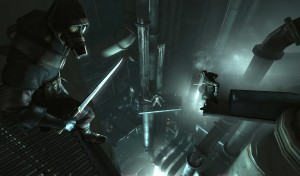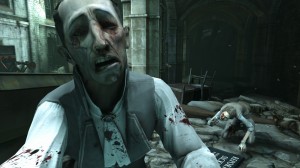Dishonored Review (PC)
- Updated: 8th Oct, 2012
 Game design has fashions. We see perfectly good mechanics and style fall out of favour only to be resurrected years later. Playing Dishonored feels like a you’re playing a dated classic, like you should have heard of it a decade ago and yet someone only just recommended it. It’s Thief, it’s Deus Ex, it’s a journey back in time to a game that just isn’t made any more.
Game design has fashions. We see perfectly good mechanics and style fall out of favour only to be resurrected years later. Playing Dishonored feels like a you’re playing a dated classic, like you should have heard of it a decade ago and yet someone only just recommended it. It’s Thief, it’s Deus Ex, it’s a journey back in time to a game that just isn’t made any more.
That’s key to understanding the excellence, as well as the missteps, of Arkane Studio’s latest delivery.
As the assassin Corvo, you seek revenge on a group of usurpers who killed the Empress of Dunwall, a whaling city overtaken by a plague which threatens to kill its entire population. You wield an array of supernatural powers that allow you to summon a swarm of rats, slow time, teleport short distances or inhabit the bodies of others. Your most useful skills, however, are those of stealth. Ensuring that you’re hardly seen is presented as the key to completing your objectives and dispatching your enemies. That’s the part that feels like Thief; this isn’t a game about careless attacking, this is a game about quiet forethought mixed with trial and error.
Stealth is what makes the game interesting, but it’s also hardly necessary. As compelling as it is to stalk from the shadows and clear a room of enemies without any of the other inhabitants realising, your character is so well equipped to fight with any assailants. It’s less that you need to avoid an encounter because you’re physically incapable of dealing with it, more that the game contrives a moral imperative for you to be non-violent; something much easier while maintaining a silent predatory nature.
This binary morality system isn’t layered into the ongoing narrative, but you’re flat out told in loading screens and tutorials that being non-violent will result in a better ending, as well as some contrivance that the more often you kill the more the world will be filled with vicious human-hungry rats who make traversing the environment more difficult, along with certain other enemy types. This is a game about stealth that largely doesn’t require any of it, but forces its use anyway.
There are a few other design choices that seemingly intend one thing but don’t truly supply it. The levels offer branching routes to reach your objectives. It stops the progression from feeling too linear; that’s the part that feels like Deus Ex. What it doesn’t do is offer a large variety of environment-specific options when performing your assassinations.
 You’ve an arsenal full of weaponry and powers that can be combined in interesting ways during a firefight – try stopping time, summoning a swarm of rats, placing a trap on the body of one, reverting time back to normal and delighting when the rats rush toward a crowd of enemies, springing the trap and cutting them all open – yet I can think of only a few instances sewn in the world that provide another way to eliminate your target. Mostly the only other alternative is to take care of them in a non-violent solution.
You’ve an arsenal full of weaponry and powers that can be combined in interesting ways during a firefight – try stopping time, summoning a swarm of rats, placing a trap on the body of one, reverting time back to normal and delighting when the rats rush toward a crowd of enemies, springing the trap and cutting them all open – yet I can think of only a few instances sewn in the world that provide another way to eliminate your target. Mostly the only other alternative is to take care of them in a non-violent solution.
We enjoy Hitman because of the plethora of options it presents and the way it tailors to your preferred route. That’s a game that offers dozens of ways specific to the mission at hand to dispatch a target. Dishonored makes novel attempts, which is why it invokes the comparison, but doesn’t give you nearly enough of that same brand of improvisation.
It lacks a lot of other activities that provide a respite from the narrative. Dishonored has one (maybe another) moment where going off the beaten path results in collecting an optional objective, but it’s with a character that will later fit into the plot. There are few minor unnecessary extras to complete in a level (you compete in a simple pistol duel or perform another assassination), but for the most part there’s only the mission at hand, or a way to alter that mission’s events. In Deus Ex, a decade old game that this title is cribbing substantially from, you could pick up an assortment of other quests from characters in hub worlds that added variety outside of the direct plot. Dishonored gives you significantly less to do than an older, similar, game.
 Although the city of Dunwall feels like a place with history and presence due to Viktor Antonov’s impeccable design it’s marred by garish textures that cry out for a fan-made conversion. It’s likely that these are a result of the game running on the Unreal Engine, a tool known foremost for the way that it handles texture. The lack of graphical fidelity is made up for with the presentation, but excuses aside it’s impossible to ignore the low-resolution assets.
Although the city of Dunwall feels like a place with history and presence due to Viktor Antonov’s impeccable design it’s marred by garish textures that cry out for a fan-made conversion. It’s likely that these are a result of the game running on the Unreal Engine, a tool known foremost for the way that it handles texture. The lack of graphical fidelity is made up for with the presentation, but excuses aside it’s impossible to ignore the low-resolution assets.
This review likely suggests at this point that the game isn’t worth your money, but that’s absolutely not intended. What it achieves is incredible. It’s a stealth action game that gives you mastery of your environment, the skills to succeed in it and enemy AI to circumvent who are vigilant but not annoying. It is an excellent game, but one that feels as if it was made a decade ago. It doesn’t coincide with modern standards of gameplay but appeals in more of a classic sense. There are few frills, there’s little impact, but it would be an enjoyable runtime at a lessened price.
Dishonored will be released on 12th October for PC, PlayStation 3 and Xbox 360.


Follow Us!